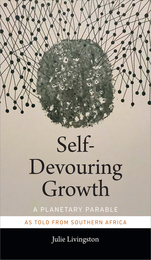3 books about Livingston, Julie

Collateral Afterworlds
Sociality Besides Redemption
Zoë H. Wool and Julie Livingston, special issue editors
Duke University Press, 2017
This issue moves beyond the binary of life and death to explore how the gray areas in between—precarious life, slow death—call into question assumptions about the social in social theory. In these “collateral afterworlds,” where the line between life and death is blurred, the presumed attachments of sociality to life and solitude to death are no longer reliable. The contributors focus on the daily experiences of enduring a difficult present unhinged from any redeeming future, addressing topics such as drug treatment centers in Mexico City, solitary death in Japan, Inuit colonial violence, human regard for animal life in India, and intimacies forged between grievously wounded soldiers. Engaging history, film, ethics, and poetics, the contributors explore the modes of intimacy, obligation, and ethical investment that arise in these spaces.
Contributors. Anne Alison, Naisargi N. Dave, Angela Garcia, Fady Joudah, Julie Livingston, Elizabeth A. Povinelli, Solmaz Sharif, Lisa Stevenson, Zoë H. Wool
Contributors. Anne Alison, Naisargi N. Dave, Angela Garcia, Fady Joudah, Julie Livingston, Elizabeth A. Povinelli, Solmaz Sharif, Lisa Stevenson, Zoë H. Wool
[more]

Improvising Medicine
An African Oncology Ward in an Emerging Cancer Epidemic
Julie Livingston
Duke University Press, 2012
In Improvising Medicine, Julie Livingston tells the story of Botswana's only dedicated cancer ward, located in its capital city of Gaborone. This affecting ethnography follows patients, their relatives, and ward staff as a cancer epidemic emerged in Botswana. The epidemic is part of an ongoing surge in cancers across the global south; the stories of Botswana's oncology ward dramatize the human stakes and intellectual and institutional challenges of an epidemic that will shape the future of global health. They convey the contingencies of high-tech medicine in a hospital where vital machines are often broken, drugs go in and out of stock, and bed-space is always at a premium. They also reveal cancer as something that happens between people. Serious illness, care, pain, disfigurement, and even death emerge as deeply social experiences. Livingston describes the cancer ward in terms of the bureaucracy, vulnerability, power, biomedical science, mortality, and hope that shape contemporary experience in southern Africa. Her ethnography is a profound reflection on the social orchestration of hope and futility in an African hospital, the politics and economics of healthcare in Africa, and palliation and disfigurement across the global south.
[more]

Self-Devouring Growth
A Planetary Parable as Told from Southern Africa
Julie Livingston
Duke University Press, 2019
Under capitalism, economic growth is seen as the key to collective well-being. In Self-Devouring Growth Julie Livingston upends this notion, showing that while consumption-driven growth may seem to benefit a particular locale, it produces a number of unacknowledged, negative consequences that ripple throughout the wider world. Structuring the book as a parable in which the example of Botswana has lessons for the rest of the globe, Livingston shows how fundamental needs for water, food, and transportation become harnessed to what she calls self-devouring growth: an unchecked and unsustainable global pursuit of economic growth that threatens catastrophic environmental destruction. As Livingston notes, improved technology alone cannot stave off such destruction; what is required is a greater accounting of the web of relationships between humans, nonhuman beings, plants, and minerals that growth entails. Livingston contends that by failing to understand these relationships and the consequences of self-devouring growth, we may be unknowingly consuming our future.
[more]
READERS
Browse our collection.
PUBLISHERS
See BiblioVault's publisher services.
STUDENT SERVICES
Files for college accessibility offices.
UChicago Accessibility Resources
home | accessibility | search | about | contact us
BiblioVault ® 2001 - 2024
The University of Chicago Press









